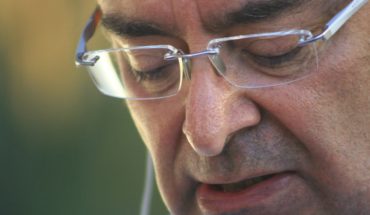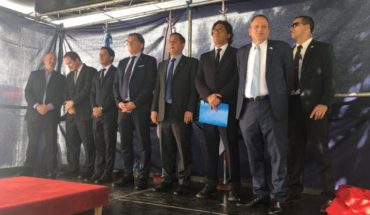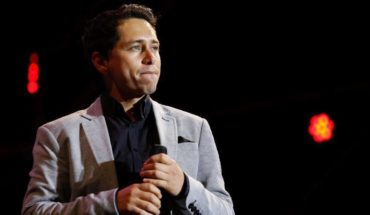In one of them, an Orwellian authoritarianism prevails. Fearful of worsening crises – climate, health and economic – citizens accept the treatment offered to them by the “strong man”: their protection in exchange for unquestionable loyalty as “subjects”. What follows is the abdication of personal power, choice or responsibility.
In the other, we are all “consumers” and self-sufficiency becomes an extreme sport. The richest have in one hand their places to escape or retire from the routine in New Zealand and in the other a ticket to Mars.
The rest of us strive to be like them, fending for ourselves as robots take jobs from us and competition for resources intensifies. increasingly scarce.
The benefits of technology, be it artificial intelligence, biotechnology, neurotechnology or agrotechnology are going to stop to the richest, as well as all the power of society.
The Third Way
Despite the bandwidth and waves dedicated to these two dystopias, there is another trajectory: we call it “future citizen”.
The authors explain that the concept of citizenship goes beyond the exercise of voting and other mandates provided for in the law.
In recent years we have been working on a book entitled “Citizens”, in which we propose a more hopeful narrative for the twenty-first century.
In this future, people are citizens, rather than subjects or consumers. With this identity, it’s easier to see that we’re all smarter than any of us. And that the strategy for navigating difficult times is to harness everyone’s diverse ideas, energy, and resources.
This form of citizenship it has nothing to do with the passport we have, and goes far beyond voting in elections. It represents the deepest meaning of the word, whose etymological roots are literally translated as “people together”: humans are defined by our fundamental interdependence, lives are meaningless without community.
It is a practice rather than a status or a possession, almost more verb than noun.
As citizens, we look around, identify the areas in which we have some influence, find our collaborators and commit ourselves. And, fundamentally, our institutions encourage us to do so.
However, tapping into this future will depend on us seeing and accepting a broader history of who we are as human beings. And how do we do it?
While writing the book, we came across countless examples of the citizen perspective. If we look beyond the headlines, we will soon discover a global and cross-sectoral phenomenon, and what may seem like isolated examples are connected by common themes.
Chile is currently immersed in the campaign to decide whether to approve a new Constitution.
Let’s think about governance. The city of Paris has just approved the creation of a permanent Citizens’ Assembly that guides policy, and has committed to distribute more than US$ 101 million a year through participatory budgets.
The Mexico City it has drawn up a Constitution for its nine million inhabitants, while Chile is in the midst of the process of ratifying a draft Magna Carta drafted by a citizen-driven Convention.
In Reykjavik (Iceland), game designers have built a participatory democracy platform that has incorporated hundreds of people into the running of the city.
Perhaps most impressive of all, Taiwan showed the world a way to overcome the pandemic, building its response around three principles: fast, fun and fair.
This led the Taiwanese government to open up its data, to convene awards for apps tracking the availability of face masks (and much more), to trust people enough to restrict movements based on the “participatory self-surveillance”, and even to create a hotline that any citizen could call with ideas on what else could be done.
The result? One of the lowest death rates in the world, without ever imposing a lockdown.
The future of citizens is also gaining ground in the business world. Many companies now aspire to create “value for the stakeholders” and not only “shareholder value”.
A former CEO of Unilever, for example, set the company’s goal of being “net positive” contributors to society. And some of the world’s largest and fastest-growing companies are experimenting with crowdsourcing and crowdfunding.
General Electric, for example, regularly uses crowdsourcing solutions for some of its main challenges. And cosmetics brand Body Shop has instituted a pioneering Youth Collective as part of its governance structure.
The Taiwanese government’s decision to allow its citizens to participate in designing policies to combat the COVID-19 pandemic is for experts a model of the citizenship of the future.
There are many more things happening below conventional radar, rooted in business models that are built to extend rather than scale.
The platform cooperativism, with which Airbnb and Uber face competition from Ride Austin and Peepl Eat, whose customers are also their owners; and equity crowdfunding, which blurs the line between shareholder and customer and powers established companies like brewdog brewdog and startups like Yuup, which is a platform that supports small businesses in the English city of Bristol.
NGOs also join
The future of citizens is also taking shape in the nonprofit sector, as organizations reimagine themselves as enablers of citizen-led movements.
In the UK, organisations such as the Royal Society for the Protection of Birds (RSPB), the World Wide Fund for Nature (WWF) and Friends of the Earth are reorienting their strategies towards participation, supporting campaigns rather than starting their own.
For its part, Greenpeace USA is taking a more collective approach, trying to be, in the words of Executive Director Annie Leonard, “a hero among heroes”.
A new platform called Restor allows grassroots nature conservation projects around the world to map their impact, connect and collaborate.
At the same time, community groups are rejecting old models of aid and charity, and seeking local solutions.
Community action offerings, for example, are an innovation in the UK that makes it easier for local people to invest in their own communities.
In Grimsby, in the north of England, a group called East Marsh United has just successfully completed a $602,000 community stock offering to buy 10 homes, which will be refurbished and then rented at a lower cost.
The project will generate a sustainable revenue stream for the rest of its operations.
Greenpeace has begun to support the initiatives of other environmental groups, rather than starting solo campaigns.
And if there’s anyone who stands out above all in this whole story, it’s Kennedy Odede: a man who started with a soccer ball and street theater in one of Nairobi’s slums and has grown his organization Shining Hope for Communities to a scale where he allowed more than two million slum dwellers supporting each otherduring the pandemic.
It even hosts a fledgling World Forum of Communities, a more collective alternative to the World Economic Forum in Davos.
Simpler than it seems
The challenge is not that the future citizen is difficult to find or complicated to articulate. It’s simple, it’s rooted in a deep truth, and it arises everywhere.
But it is hidden, because every day people tell themselves other stories of society and their role in it.
Critically, institutions reinforce these other narratives, taking the oxygen of the imagination, making them seem like the only possibilities.
We are not the first to suggest that stories can shape societies. In a landmark essay written 25 years ago, Donella Meadows, a pioneer of systems thinking, proposed that societies cling to mindsets or paradigms that she described as “shared social agreements about the nature of reality (…) the deepest set of beliefs about how the world works.”
They are, according to her, “the sources of the systems.”
And more recently, sociologist Arlie Russell Hochschild has tried to understand the American communities she studies through her “deep history”, a “subjective lens” through which they see the world.
On the scale
We propose that one of the most widespread deep stories is the “consumer story”.
It goes like this: our role as individuals is to pursue our own self-interest, on the basis that it will add to the best outcomes for society. We define ourselves through competition.
Along the way, our choices represent our power, our creativity, our identity: make us who we are.
All organizations and institutions, from businesses to charities to government, exist to offer these options. All are reduced to suppliers of products and services.
This consumer story is what leads us to Future B, the future of Martian leaks, billionaires with disproportionate power and extreme inequality.
The capitalist model, despite guaranteeing rights and freedoms, has left millions around the world mired in poverty.
As for Future A, this Orwellian future corresponds to the return of the “subject’s account”, as in “subjects of the King”.
In this story, the leader is the one who knows best, charting the way forward and declaring our duties.
The rest of us are innocent, ignorant of important matters. This deal becomes more attractive the greater the danger, so this story reappears today.
Governments and organizations that emerge from the subject’s account are paternalistic and hierarchical, with a few supposedly superiors at the top of the pyramid.
Already in China, the consequences of this story are clear. The country’s Skynet project has more than 400 million surveillance cameras, with an increasing number of them automatically hooked to facial recognition and other artificial intelligence programs.
The government knows almost everything its citizens do, from shopping to driving behavior to social media posts to the amount of time a person spends playing video games.
There is also the Social Credit System, a huge system of data collection and processing, which automatically awards prizes or punishments.
An already widespread punishment is the ban on buying flights: according to figures released by China’s National Public Credit Information Center, this had already happened 17.5 million times by the end of 2018.
Other punishments reportedly include automatically reducing the internet speed or confiscating the pet.
The story of the subject preceded the history of the consumer. It was the dominant story for centuries, shaping the interactions of most of humanity, at least from the seventeenth century, until it crumbled over the course of the two world wars of the twentieth century.
Consumer history, as inevitable as it may seem, only rose from the ashes of the subject, and has only been the dominant history of humanity for the past 70 years.
The Orwellian model is applied in countries like China, where authorities today know almost everything their citizens do, from what they spend their money on and how much time they spend playing video games.
Unlike the subject, the consumer’s story seemed to promise a golden dream, with its wider distribution of resources and wealth, its replacement of aristocracy by meritocracy.
But now the history of consumption is cracking. It is collapsing under the weight of its own contradictions, and threatens to drag us with it.
We have such widespread inequality that it threatens the security of everyone (even the richest), while the narrative says that our main responsibility is to compete to hoard more.
We have an ecological collapse, while history insists that our identity and status depend on ever-increasing consumption. We have an epidemic of loneliness and mental health problems, while the story tells us that we are alone.
Citizens of tomorrow
It’s the old stories that are broken, not humanity.
The fall of the subject’s narrative and the rise of the consumer are proof that change at the level of a deep narrative is possible. The citizen narrative can replace the consumer, as the consumer replaced the subject.
To realize the future citizen, we must not accept what we are given as the only possibility, as the subjects do; nor throw our toys out of the stroller when we don’t like what we’re offered, as consumers do.
As citizens, we must propose, not just reject. We must establish a basis of belief in others. We must start from where we are, accept responsibility, and create meaningful opportunities for each to contribute as we do so.
We must step forward and participate. As pioneering architect and designer Buckminster Fuller wrote, “You never change things by fighting against existing reality. To change something, you have to create a new model that makes existing models obsolete.”
Citizens together can achieve more change than individually, the authors note.
The process of rewriting history is demanding for all of us. When cracks appear in a long-held belief, it causes anxiety and pain.
As the safe world is replaced by great uncertainty, the risk is that we cling more than ever to what we know. The gravitational pull of the known is exerted, no matter how dysfunctional we know the known to be.
When we recognize this, we can maintain the space for this collapse and transition more smoothly, more respectfully, more carefully.
Otherwise, anxiety turns to anger, and people lose trust and faith in others and their institutions.
The result risks becoming a vicious circle: as the challenges of our time intensify, we rely less on our leaders, the outlets we seek in our discontent — such as anti-scientific beliefs or conspiracy theories — become more extreme, and our leaders in turn trust us less.
They are even more inclined to stick to what they know – the old stories – denying us the ability to act while they are dedicated to uselessly trying to solve the challenges for us, without us.
Therefore, the most essential work right now should be a reimagining of what leadership is. If those in positions of power act as if there is nothing wrong, nothing to do with it, our distrust of them deepens further.
Leaders who build the future of citizens begin by acknowledging uncertainty, sharing with us the questions and challenges rather than providing us with (or not providing) the answers.
Create opportunities for us to participate and contribute. They cultivate so-called “safe uncertainty”: they recognize the unknowns, not deny them.
They don’t pretend to know exactly what the future will look like. But they assure us that the best way to build it is to work together. As philosopher and activist Adrienne Maree Brown says: “No one is special; we are all needed”.
To survive and thrive, we must enter the future citizen. We must see ourselves as citizens: people who actively shape the world around us, who cultivate meaningful connections with their community and institutions, who can imagine a different and better life, who care and take responsibility, and who create opportunities for others to do the same.
Crucially, the leaders of our institutions too they must see people as citizens, and treat us as such.
If we are able to delve into the future citizen, we will be able to face our innumerable challenges: economic insecurity, ecological emergency, threats to public health, political polarization, etc. We will be able to build a future. We can have a future together.




